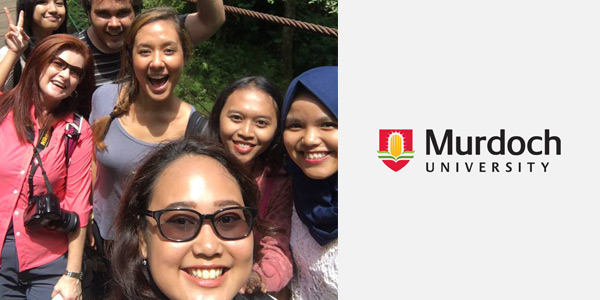
Katherine Logan is a Murdoch University student undertaking ACICIS’ International Relations Program (IRP) at Parahyangan Catholic University.
Katherine is studying in Indonesia with the support of a $6,000 New Colombo Plan Mobility Grant.
Q: Why did you decide to undertake the ACICIS program?
To learn about the Australian-Indonesian relationship better and to gain a better understanding of Indonesian politics, particularly their domestic politics which is not well understood until you speak on the ground with everyday Indonesians in different provinces in Indonesia.
Q: What classes are you currently enrolled in?
Conflict Resolution: understanding precursors to conflicts and resolution processes during and after.
NGO and Civil Society Empowerment: understanding the NGO sector in Indonesia and what encompasses the ideas behind NGOs and their takes on achieving their goals within political and ideological structures here.
Bahasa Indonesia: learning the Indonesian language is so helpful for everyday living in Indonesia.
Indonesian Politics: understanding the history of Indonesia prior to Dutch colonisation, during it, the Second World War, the rise and fall of Soekarno, the Suharto regime and the 1998 riots. Everything and all thing political about Indonesia from an Indonesian’s perspective.
Politics of International Business: looking at MNCs, globalisation, environmental and humanitarian issues, corporate social responsibility.
Regionalism in SE Asia: heavily focused on ASEAN and how it shapes diplomacy in SE Asia.
Q: Are you involved in any clubs/societies at the university?
LISTRA: for traditional drumming, we learn songs from different provinces and they are all matched with traditional dancing.
Jiujit-su: Japanese version of the Brazilian martial art.
Q: How will the International Relations Program influence your future career or study?
It made me consider that I still have so much to learn that I’ll be definitely considering Masters after my undergraduate if I get the grades.
Q: How does studying International Relations from an Indonesian perspective differ to International Relations from an Australian perspective?
It is so important to understand the culture and history of a country to better understand how things work the way they do (in Indonesia). The history and culture of the people are so different to Australia and the archipelago factor, and population affect policy making in such a different way, particularly how much impact the military has in politics due to the historical nature of Indonesia post de-colonisation.
Q: What do you like to do in your spare time in Bandung?
Avoiding crowded places so lots of yoga and gym, small cafes and reading.
Q: Are you undertaking an internship or volunteering while in Indonesia?
Yes, I’m currently interning a social research institution, AKATIGA. They’ve received plenty of funding via third parties from the Australian Government’s old AusAID programme that is now under the DFAT banner. They’re at an interesting point in their lifeline, existing during the Suharto regime and understanding the importance of diversifying funding to get more research out there. They also release a social research journal and host events, talks and do workshops on site, as well as having a little library for the interesting social sciences people of Bandung to visit.
One day is never the same and the people that are a part of this organisation are amazing to talk to about perspectives of what they’ve seen in rural places of Indonesia, away from the Java-centric politics of Indonesia. They’ve always got work for me to do and I’m currently looking at future research funding opportunities through Australia so it’s definitely keeping me busy with university.
Q: Favourite Indonesian food/ Favourite place to eat?
Kehidupan for the vegan food that is not so fried and semi-healthy; and any Rumah Makan Padang (food from Padang, Sumatra) for their vegetables, potato balls (perkedel) and green chilli sauce (sambal hijau).
Q: Favourite Indonesian word/phrase?
Iyuuuuuu…. (yes).
Q: What places in Indonesia have you visited during your semester so far?
Bali (not my choice) and Central Kalimantan to visit Tanjung Puting to understand more about the Orang Foundation International’s challenges amongst palm oil plantations in rehabilitating orang utans that are domesticated and semi-wild. It is a beautiful part of Indonesia and Borneo is one of those places on Earth, like Papua/PNG, that you just want to see retained in wilderness for future generations to see so glad to tick that off my bucket list.
